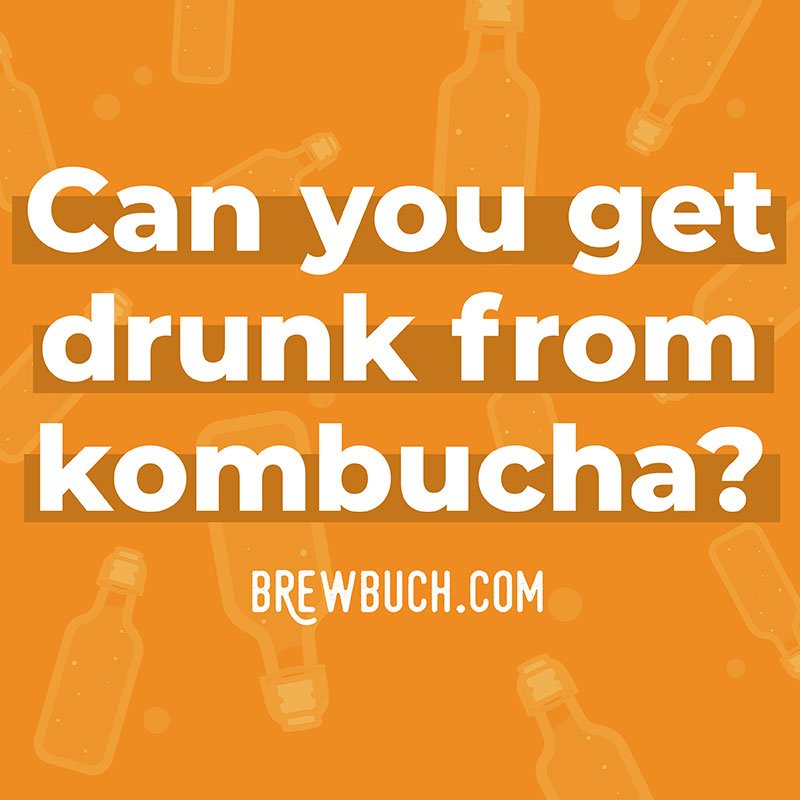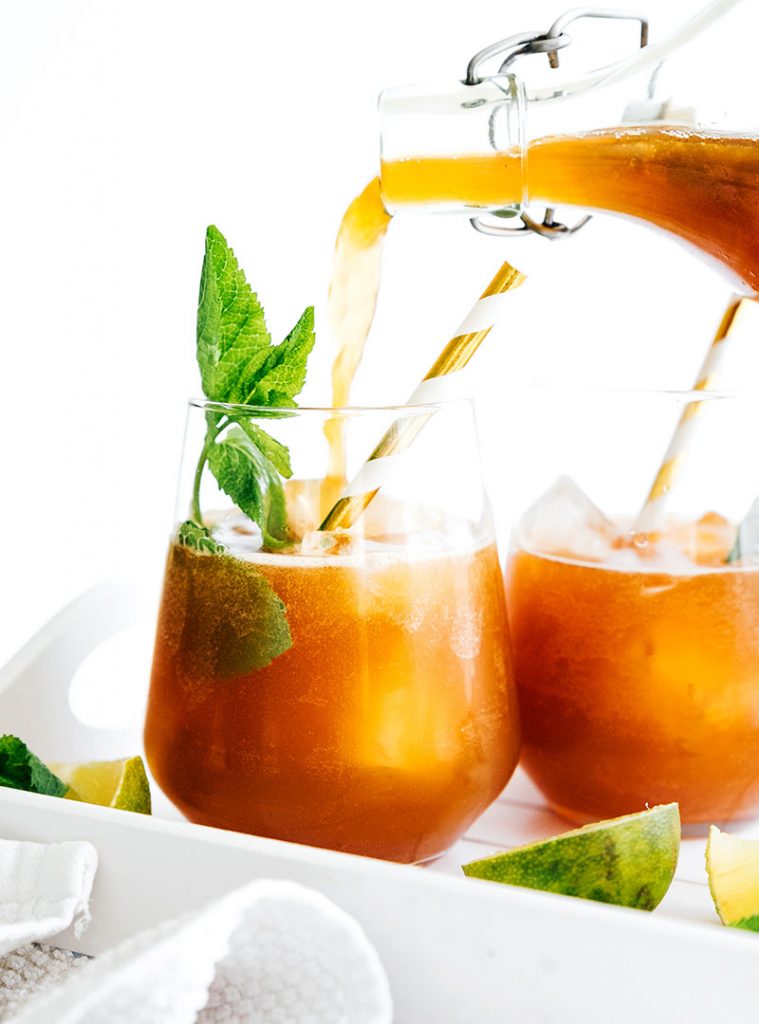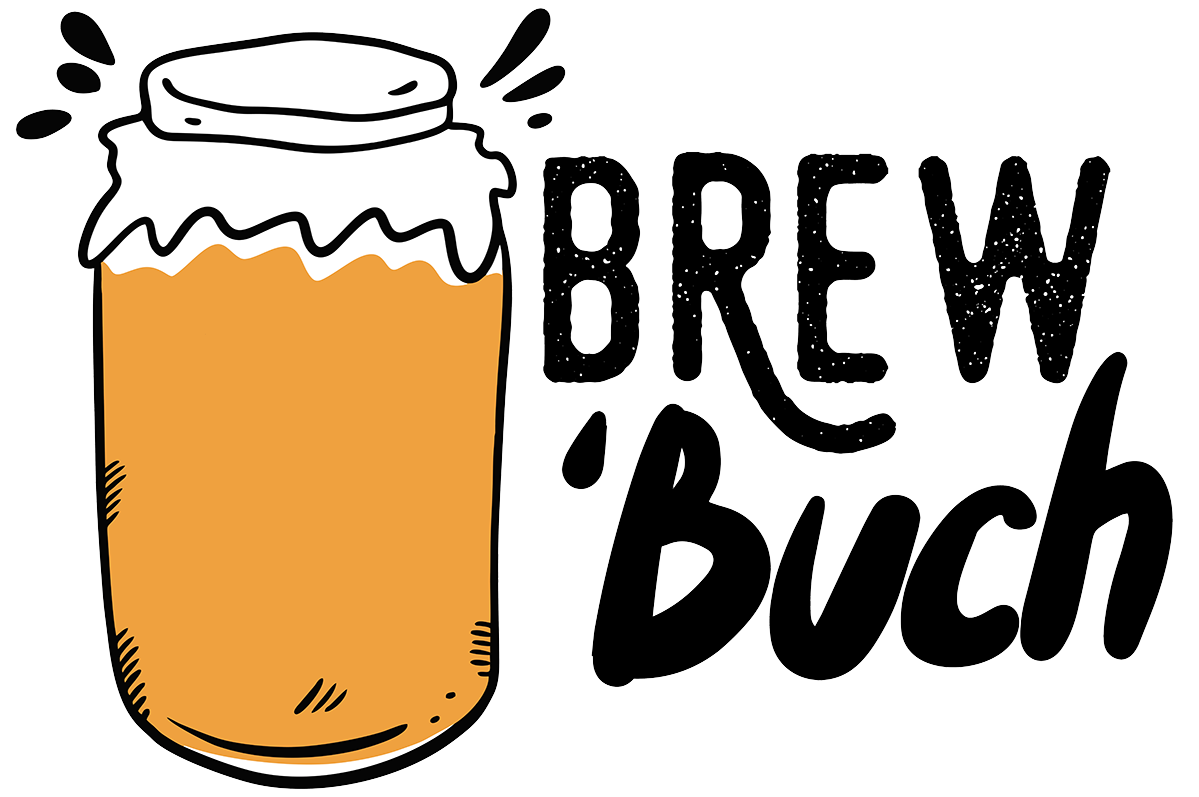Kombucha, the popular fermented tea, has a boozy little secret…it contains alcohol! But is there enough alcohol in kombucha to get you drunk? How much alcohol is in kombucha? And is there a way to measure the alcohol content of your home brewed kombucha? We’re answering it all here in this comprehensive guide!

Perhaps you noticed the message, “contains trace amounts of alcohol” on the bottle. Or maybe you downed that bottle of home brew and it has you feeling a certain kind of way. And now you’re wondering…can kombucha get me drunk?
Well there is alcohol in kombucha, though it’s usually in such trace amounts that you wouldn’t feel intoxication effects. Usually…
is there alcohol in kombucha?
Kombucha is made through a fermentation process of tea with the help of bacteria and yeast (yum!). These bacteria and yeast (otherwise known as a SCOBY, or symbiotic culture of bacteria and yeast) work together to transform sweetened tea into kombucha.
The yeast eat the sugars in your tea, transforming them into ethanol. The bacteria feed on this ethanol, turning it into acetic acid and giving kombucha its distinctively sour taste, along with it’s probiotics.
But bacteria don’t eat all of the ethanol, so some is left in the kombucha when you crack open the bottle, making that batch of kombucha slightly alcoholic.
how much Alcohol Is in kombucha?
Alcohol In Commercial Kombucha
Most store bought brands of kombucha contain a small amount of alcohol, around 0.5% ABV. The Food and Drug Administration has regulations that legally requires any beverages containing more alcohol than this to be labelled as an alcoholic beverage. (For reference, your average beer contains about 5% ABV).
So do you have to be 21 to buy kombucha? No. Store bought kombucha is generally considered to be a non-alcoholic beverage. As long as the amount of alcohol is under 0.5% ABV, you do not have to be 21 to purchase kombucha.
Alcohol In Homemade Kombucha
Homemade kombucha can contain much more alcohol than the store bought varieties, because the fermentation length and environment is often less controlled.
Generally if the yeast are more active (like when they’re warmed or have a longer fermentation time), there will be more alcohol in the finished kombucha, ranging from 0.5% to 3% ABV.
How to you test alcohol in kombucha?
Are you a home brewer wondering how much alcohol is in your kombucha? This alcohol testing kit is an affordable tool for tracking the level of alcohol in your home brew! It’s important to note that this isn’t going to give you an exact reading of the alcohol level, but it will be close enough to have a good indication of the alcohol in kombucha.
“is there a way to increase the alcohol content of my buch at home?”

So can kombucha make you feel tipsy or drunk?
You’re unlikely to feel any intoxication effects from your average bottle of kombucha. To feel the same effects of 1 beer, you’d have to drink 10x that amount of kombucha.
The rise of Hard Kombucha
But the story continues! Obviously the combined love of kombucha and love of craft beers/ciders has produced something delicious and glorious…hard kombucha. As in, kombucha that intentionally contains higher alcohol content. Commercial kombucha brands have been popping up with new alcoholic brews containing anywhere from 3% to 8% ABV. And I am here for it.
So while your average bottle of buch is unlikely to get you tipsy, hard kombucha (or kombucha cocktails) just might do the job (if that’s your sort of thing).
You can make your own hard kombucha with the addition of a few ingredients and an extra step. Here’s how to make hard kombucha. Happy brewing!

I think Joe did too much blow…
You people are insane! No need to jack with mother nature’s perfection. Adding a little something right before you drink it, that I can accept, (if you’re a wimp) but God made kombucha perfectly perfect to counterbalance all mankind’s toxins. I’ve been growing kombucha for 28 years, by the way.
How can you make low alcohol Kombucha and can that hydrometer you link to measure low amounts of alcohol?
Thanks!
You can make lower alcohol kombucha by simply letting it ferment for less time. But unfortunately to get accurate readings, you would need to send the samples into a lab (there aren’t great options for home testing kombucha).
is there a way to increase the alcohol content of my buch at home..?!
You can add a little more sugar and let it ferment for longer! I’m in the midst of experimenting with hard kombucha – should have a guide up within a month or so!
So adding more sugar at the 1st fermentation stage and letting it go longer. Will letting it go longer not lead to a more acidic taste?
Yes it will, but a slight increase in sugar should help with that. That said, you’re not going to get truly “hard kombucha” without adding a different strain of yeast (like champagne yeast), because the yeast in kombucha isn’t mean for high alcoholic conditions.